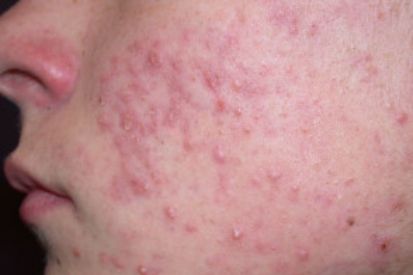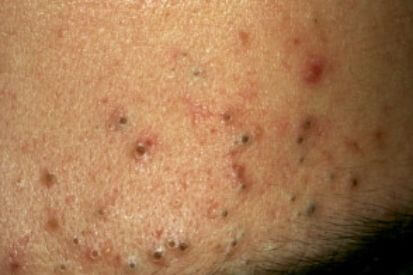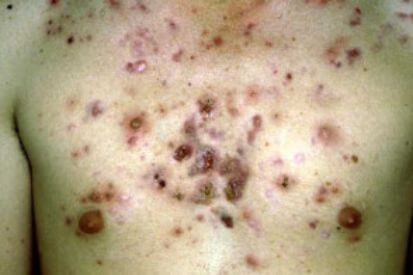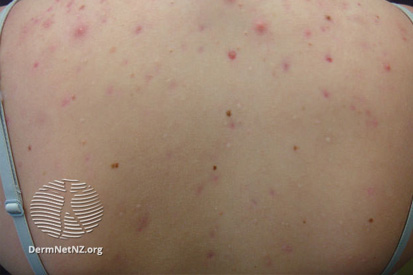Acne
Acne is a widespread skin condition affecting both adolescents and adults, with over 650 million people globally suffering from this prevalent issue. Acne develops when natural skin oils and dead skin cells clog hair follicles and pores, providing an environment for bacteria to thrive and exacerbating pimples, whiteheads, and other acne symptoms. This condition impacts individuals of all races and genders.
At The Dermatology & Skin Surgery Center at Creedmoor, your skin health is our top priority. Whether you're dealing with acne at 13, 23, or 53, our expert dermatologists are here to help. Schedule an appointment with a trusted Creedmoor provider for a personalized treatment plan tailored to your skin's unique needs. Start your journey to clear, healthy skin today!
Examples of Acne




What are the Symptoms of Acne?
Before you can understand how to get rid of acne, it’s important to know the symptoms and how they may appear. Acne can range from mild blemishes to more severe, painful lesions, and it often affects not just the face but other areas of the body as well.
Common acne symptoms include:
- Pimples, blackheads, and whiteheads
- Red, inflamed bumps (papules)
- Pus-filled lesions (pustules)
- Large, firm nodules under the skin
- Painful cysts that may leave scars
- Breakouts on the face, neck, chest, back, shoulders, upper arms, or buttocks
What Causes Acne?
Acne develops when oil, dead skin cells, and bacteria build up in the pores, leading to inflammation and breakouts. Hormonal fluctuations are one of the most common triggers, especially during puberty, menstruation, and pregnancy, when hormone levels can increase oil production. Bacterial infection within clogged pores further aggravates the skin, creating redness, swelling, and sometimes painful lesions.
Other factors can exacerbate acne, including an unhealthy diet, certain medications, and stress. While stress doesn’t directly cause acne, it can trigger flare-ups and slow skin healing. Recognizing these influences is crucial for selecting the appropriate treatment and prevention plan.
- Hormonal Fluctuations: Hormonal changes, especially during puberty, menstruation, and pregnancy, can stimulate acne.
- Bacterial Infection: When hair follicles become clogged with excess oil and dead skin cells, bacteria multiply, triggering inflammation.
- Diet: Some studies suggest that certain foods may influence acne development.
- Medications: Certain medications can contribute to acne development.
- Stress: Stress doesn't directly cause acne, but it can exacerbate existing conditions.
How to Prevent Acne
Preventing acne starts with simple, consistent habits that support healthy skin. By following a daily routine and making mindful lifestyle choices, you can reduce breakouts and maintain clearer skin over time.
Key acne prevention strategies include:
- Cleansing your face twice daily with a gentle, non-comedogenic cleanser
- Moisturizing with an oil-free, non-comedogenic product
- Staying hydrated and maintaining a balanced diet
- Avoiding touching your face to reduce bacterial transfer
- Seeking personalized guidance from a dermatologist for persistent issues
Working with an expert at Pinnacle Dermatology can help you establish a foundation for lifelong skin health and create a routine tailored to your unique skin needs.
Acne FAQs
Over-the-counter acne products typically contain ingredients like benzoyl peroxide, salicylic acid, or alpha hydroxy acids. These products can be effective for mild acne. Prescription treatments, on the other hand, may include stronger formulations of these ingredients or other medications such as topical or oral antibiotics, retinoids, or hormonal therapies. Your dermatologist can assess the severity of the acne and recommend an appropriate treatment plan.
While acne cannot always be prevented, there are steps you can take to reduce the risk. These include keeping your skin clean, avoiding excessive scrubbing or picking at your skin, using non-comedogenic skincare products, and managing stress levels.
Acne is a common skin condition that can affect people of all ages, genders, and ethnicities. It is most commonly associated with adolescence due to hormonal changes during puberty, but acne can persist or develop in adults as well.
There are several types of acne, including whiteheads (closed comedones), blackheads (open comedones), papules (small red bumps), pustules (pimples containing pus), nodules (large, painful lumps), and cysts (deep, painful pimples).
Dermatologists tailor acne treatments based on the individual's skin type and the severity of the condition. Common treatments include topical medications like retinoids and benzoyl peroxide, oral antibiotics, and, in some cases, oral contraceptives or isotretinoin. Light and laser therapies may also be recommended. Results vary, but many patients experience a significant reduction in acne lesions, improved skin texture, and minimized scarring. Consistency with the prescribed treatment plan is key to achieving optimal outcomes.
Dermatologists offer various treatments to address acne scarring, including laser therapy, chemical peels, microneedling, and fillers. While complete removal of scars may not always be possible, significant improvement is often achievable. Dermatologists work with patients to develop customized treatment plans, providing realistic expectations and guiding them through a process that can lead to smoother, more even-toned skin.
Early intervention and consistent follow-up with a dermatologist are crucial for optimizing outcomes in the management of acne and its potential scarring.
From Our QualDerm Family of Brands: Acne Treatment Options
How to Treat Acne
Effective acne care isn’t one-size-fits-all. At Pinnacle Dermatology, our specialists create personalized plans that may include topical creams and gels, oral antibiotics, hormonal therapy, or retinoids for more severe cases. Each treatment is designed to reduce breakouts and target the underlying causes of acne.
Our dermatologists take the time to identify what’s driving your acne and build a treatment strategy that works for you. Whether you’re dealing with occasional flare-ups or chronic, severe acne, we’re here to help you achieve clearer, healthier skin. Schedule your appointment with Pinnacle Dermatology today and take the first step toward lasting results and renewed confidence.
Featured Products for Acne
Check your local office for current stock!
Check your local office for current stock!
